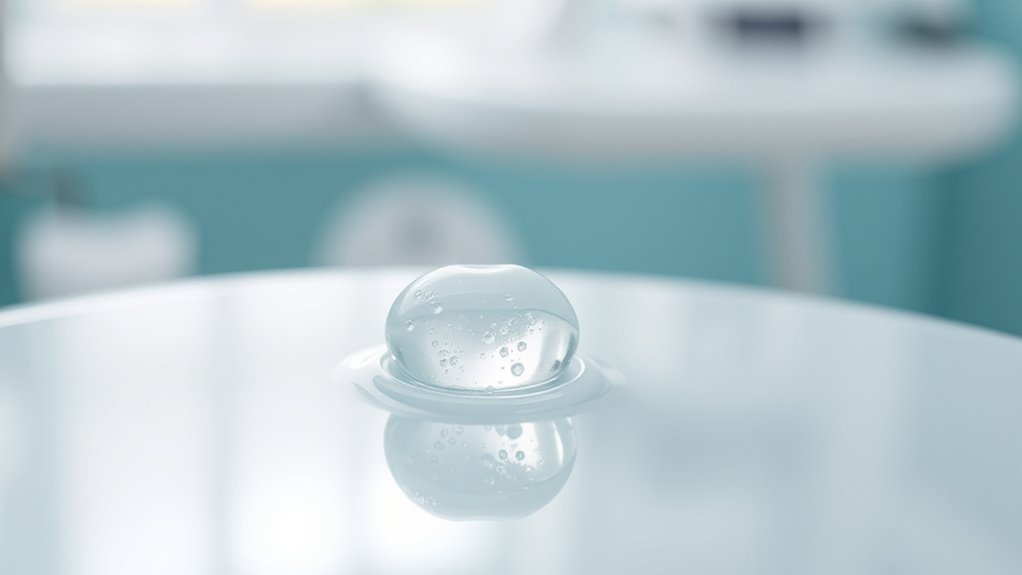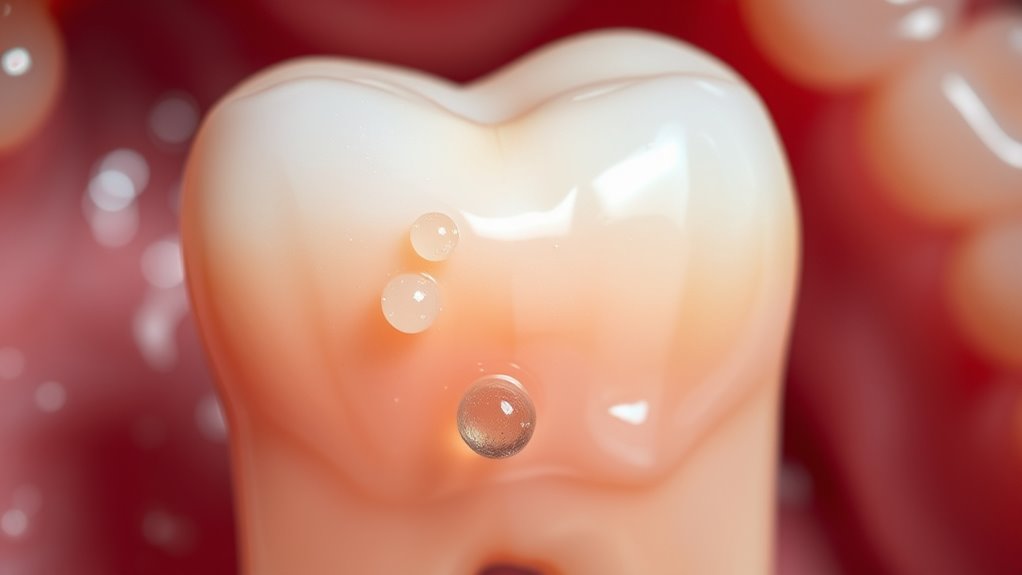Your saliva’s composition and flow rate are key to preventing cavities. When you have strong, mineral-rich saliva that flows well, it helps neutralize acids, rebuilds enamel, and keeps harmful bacteria in check. Genetics influence these factors, making some people naturally more resistant to cavities. If you’re curious about how your unique saliva traits protect your smile and what else you can do, there’s more to discover below.
Key Takeaways
- Individuals with higher saliva flow rates effectively clear bacteria and food debris, reducing cavity risk.
- Saliva rich in minerals like calcium and phosphate promotes natural remineralization of tooth enamel.
- Genetic factors influence saliva composition, enhancing its ability to neutralize acids and inhibit harmful bacteria.
- Stronger, more resilient enamel, often genetically determined, better resists acid attacks and cavity formation.
- Personalized saliva profiles contribute to natural cavity resistance, reducing the need for extensive dental interventions.

Some people never develop cavities, even with less-than-perfect oral hygiene habits. This isn’t just luck; it’s often linked to the unique way their saliva works inside their mouths. Saliva composition plays a pivotal role in protecting your teeth from decay. It’s not just about washing away food particles; saliva contains minerals like calcium and phosphate that help repair enamel and neutralize acids produced by bacteria. When your saliva is rich in these minerals and maintains a balanced pH, it creates a natural defense system, making it harder for cavities to form. Additionally, saliva contains enzymes and antimicrobial agents that suppress harmful bacteria, reducing the risk of decay. Saliva flow rate can also influence how effectively your mouth clears away debris and pathogens, further impacting cavity risk.
Your genetic factors greatly influence your saliva composition. Some people are born with a saliva makeup that’s more effective at remineralizing teeth and fighting off bacterial growth. For example, genetic variations can determine the flow rate of saliva, its buffering capacity, and the concentration of protective minerals and enzymes. If you naturally produce more saliva or your saliva is particularly rich in protective components, you have an inherent advantage in cavity prevention. Conversely, if your saliva tends to be less mineralized or less effective at neutralizing acids, you might be more susceptible to cavities, even if you brush regularly.
Beyond just saliva, your genetic makeup also influences other factors like the strength and structure of your enamel. Some people have naturally thicker or more resilient enamel, which can withstand acid attacks better and make it more difficult for cavities to develop. These genetic factors work in tandem with saliva composition to create a mouth environment that’s less hospitable to decay-causing bacteria.
Understanding this connection can help you realize that your oral health isn’t solely about brushing and flossing. While good habits are essential, your body’s innate qualities, like saliva composition influenced by genetics, play an essential role. If you’re lucky enough to have a saliva profile that naturally guards against cavities, you might find yourself needing less intervention. For others, knowing about these genetic factors can motivate you to adopt additional protective measures, such as fluoride treatments or dietary adjustments, to compensate for any inherent vulnerabilities. Ultimately, recognizing the importance of saliva science and genetic influences highlights how complex and personalized cavity prevention truly is.
Frequently Asked Questions
Can Saliva Production Vary Daily or Seasonally?
Saliva variability can definitely change daily or seasonally, affecting your oral health. Seasonal saliva levels, for example, may drop during colder months due to lower humidity and dehydration, leading to dry mouth. Daily fluctuations can also occur based on your hydration, diet, or stress levels. These variations influence your saliva’s ability to neutralize acids and wash away bacteria, impacting cavity risk and overall oral comfort throughout the year.
Do Genetics Influence Saliva Composition and Cavity Resistance?
Genetics do influence your saliva composition and cavity resistance through genetic markers that determine saliva enzymes and flow rate. These factors affect how well your saliva neutralizes acids and fights bacteria. If you have favorable genetic markers, your saliva may contain more effective enzymes and produce a steady flow, helping prevent cavities naturally. Understanding your genetics can give you insight into your unique cavity risk and how your saliva protects your teeth.
How Does Hydration Affect Saliva’s Cavity-Fighting Properties?
You might worry that hydration isn’t essential for cavity prevention, but it actually plays a key role. When you’re well-hydrated, your saliva’s pH stays balanced, making it less acidic and better at fighting bacteria. Plus, good hydration boosts mineral content in saliva, helping repair tooth enamel. So, drinking enough water keeps your saliva effective, reducing cavity risk and supporting your oral health naturally.
Are There Specific Foods That Boost Saliva’s Protective Effects?
Certain foods can boost saliva’s protective effects through food synergy with saliva enzymes. Crunchy fruits and vegetables like apples and carrots stimulate saliva flow, helping neutralize acids. Chewing sugar-free gum also enhances saliva production. Dairy products, rich in calcium and phosphates, support enamel repair. Combining these foods with proper hydration maximizes saliva’s ability to fight cavities, making your mouth’s natural defenses stronger and more effective.
Can Saliva Science Lead to New Cavity Prevention Treatments?
Did you know that saliva contains enzymes that can break down harmful bacteria? This advances saliva science, opening doors to new cavity prevention treatments. By understanding how saliva’s enzymes support your oral microbiome, researchers could develop targeted therapies to boost natural defenses. Future treatments may harness saliva’s power, reducing cavity risk without relying solely on fluoride or other traditional methods. This progress promises healthier smiles through natural, science-backed approaches.
Conclusion
Understanding saliva’s role reveals why some people never get cavities. Your saliva constantly fights off harmful bacteria, neutralizes acids, and repairs tooth enamel. Imagine that, on average, your mouth produces about 1 to 2 liters of saliva daily—enough to fill a small water bottle. By maintaining good oral hygiene and letting saliva do its job, you can markedly reduce your risk of cavities. So, trust your saliva’s natural defense and keep your smile healthy and cavity-free.









